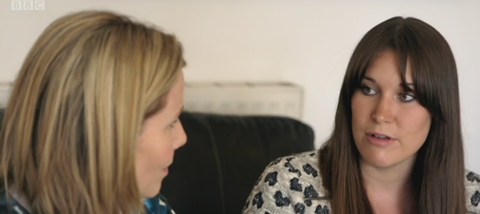
On Wednesday night, a documentary by the actress and comedian Sally Phillips was shown on BBC2, A world without Down’s Syndrome?, raising the issue of prenatal screening for disabilities such as Down’s syndrome.
At turns informative, fascinating, chilling, and moving, Phillips’s programme was a wake-up call to society on the nature of Down’s syndrome – what it is, and what it isn’t – and also to the attitudes towards disability that inform and drive the ‘screening out’ of certain kinds of human being before birth. It also however, revealed the nature of the means by which this screening happens: the practice of late term and materially eugenic abortion.
According to the latest figures, in the UK 90% of babies with Down’s syndrome that are detected before birth are aborted. In Iceland, which has introduced the Non-Invasive Prenatal Test (NIPT) for Down’s syndrome, the abortion rate is 100%.
People still regard disabled children as ‘burdens’ who must have terrible lives
As the documentary showed, this does not just manifest itself in parental attitudes, but the way that parents with a diagnosis of ‘fetal disability’ are treated by the medical system: not with the provision of information and support, but the stark assumption, and even directive advice, that abortion will be the next course of action.
The truth about late term abortions
The still endemic anti-disabled discrimination in our culture and medical system causes the routine practice of disability abortion. This is enabled thanks to section 1(1)(d) of the Abortion Act 1967 (as reformed by another law in 1990), and is available up to birth. Most people are unaware of this, and shocked when they learn that this is actually the law of the land. It was evident from the reaction of many people on social media that they were ignorant of the fact that babies with Down’s syndrome can be aborted throughout pregnancy.
The chilling reality of this is revealed in the documentary, when Sally Phillips goes to meet ‘Kate’ (pictured above) a woman who describes to her the abortion she undertook because her baby had Down’s syndrome, at 25 weeks gestation: “So you take a tablet that starts to break down the placenta, and then I had an injection to stop his heart, so it was instant. One minute you could feel him wriggling around, and then, the next second, he was gone”.
Kate was describing a late term chemical termination with ‘feticide’. This is when the baby is killed prior to her body being delivered from her mother’s womb by the use of abortifacients. The ending of the baby’s life occurs by the injection of a saline solution (potassium chloride – salt) into the child’s heart, causing her to have a fatal heart attack.
This happens because potassium is a mineral that possesses an electric charge, and it disrupts the electrical conduction of heart muscle, preventing heart cells from preparing for their next contraction. This means that the baby’s heart is forced to stop beating, causing her death.
Watching the film, you can tell that for both Kate and for Sally Phillips, this was a difficult thing to say and to hear. The idea of late term abortions is horrifying, involving more obviously than at earlier weeks gestation the killing of a baby human being.
Kate went through with her abortion because she was convinced that this was better for her child. She researched the online accounts of stories of children, and because children with Down’s syndrome have more difficult lives, and fewer opportunities, she felt that this was not what she wanted for her son. Essentially, she opted for a kind of euthanasia in utero.
The truth about choice
Whilst Phillips’s documentary gently challenged whether the attitude towards disability underlying this decision was a positive one, it did so with the assumption that whether to ‘terminate’ or not is the parents’ (actually more specifically the mother’s) ‘choice’. This created a tension with the other principle articulated in the programme: the right to life of children with Down’s syndrome.
This was only resolved by the implicit realisation that ‘choice’ does not occur in a vacuum, but is formed in the context of a culture. As we saw the increasing ability of science to detect what pre-existing genetic tendencies individual human beings have, we saw how abortion can enable and institutionalise inequality by the ‘screening out’ of human beings with less than ‘perfect’ properties.
‘Choice’ does not occur in a vacuum, but is formed in the context of a culture
Just as abortion on demand can enable the hiding of sexual abuse – especially for teenagers without parental notification nor consent – or sex-selective abortions, so we are now seeing that it enables a kind of material eugenics in which even self-perceptively compassionate discriminatory attitudes towards disabled people leads to their elimination in the womb.
Sally Phillips’s documentary was a rich account of a nuanced and complex topic, part of which involved the revelation not only of the inhumane implications of allowing abortion as we have it, but the nature of what that ‘choice’ entails.
As a society, seriously considering this – and the new campaign for the Disability Equality Bill introduced by Lord Shinkwin – will be fundamental to deciding, as Phillips finally articulates it, “what kind of society we want to be”.
Peter D. Williams is executive officer of Right To Life
Click here to request a free copy of Premier Christianity magazine





























